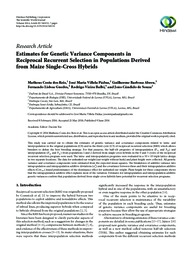Estimates for genetic variance components in reciprocal recurrent selection in populations derived from maize single-cross hybrids.
Estimates for genetic variance components in reciprocal recurrent selection in populations derived from maize single-cross hybrids.
Author(s): REIS, M. C. dos; PÁDUA, J. M. V.; ABREU, G. B.; GUEDES, F. L.; BALBI, R. V.; SOUZA, J. C. de
Summary: This study was carried out to obtain the estimates of genetic variance and covariance components related to intra- and interpopulation in the original populations (C0) and in the third cycle (C3) of reciprocal recurrent selection (RRS) which allows breeders to define the best breeding strategy. For that purpose, the half-sib progenies of intrapopulation (P11 and P22) and interpopulation (P12 and P21) from populations 1 and 2 derived from single-cross hybrids in the 0 and 3 cycles of the reciprocal recurrent selection program were used. The intra- and interpopulation progenies were evaluated in a 10 × 10 triple lattice design in two separate locations.The data for unhusked ear weight (ear weight without husk) and plant height were collected. All genetic variance and covariance components were estimated from the expected mean squares. The breakdown of additive variance into intrapopulation and interpopulation additive deviations (??2??) and the covariance between these and their intrapopulation additive effects (CovAr) found predominance of the dominance effect for unhusked ear weight. Plant height for these components shows that the intrapopulation additive effect explains most of the variation. Estimates for intrapopulation and interpopulation additive genetic variances confirm that populations derived from single-cross hybrids have potential for recurrent selection programs.
Publication year: 2014
Types of publication: Journal article
Unit: Embrapa Maranhão
Keywords: Híbridos, Maize, Melhoramento genético, Milho, Variância genética
Observation
Some of Embrapa's publications are published as ePub files. To read them, use or download one of the following free software options to your computer or mobile device. Android: Google Play Books; IOS: iBooks; Windows and Linux: Calibre.
Access other publications
Access the Agricultural Research Database (BDPA) to consult Embrapa's full library collection and records.
Visit Embrapa Bookstore to purchase books and other publications sold by Embrapa.

